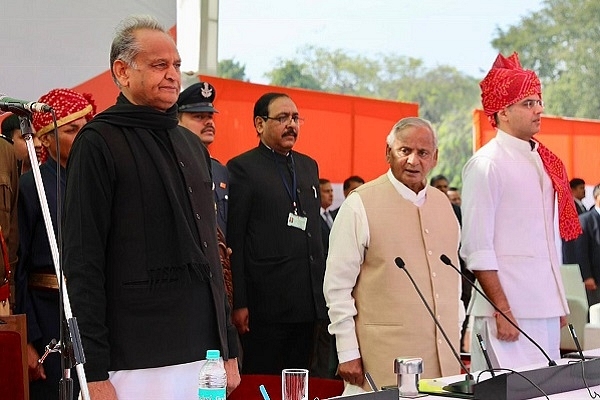Insta
First Major Decision By New Congress Government In Rajasthan: Scraps Raje’s ‘Minimum Education Qualification’ Criterion For Contesting Local Polls

The swearing-in ceremony in Rajasthan (@INCIndia/Twitter)
In its first major decisions, the newly elected Congress government in Rajasthan government abolished the criterion of a minimum educational qualification to contest local body elections introduced by the previous Vasundhara Raje-led BJP government, PTI has reported.
Vasundhara Raje-led BJP government in Rajasthan was the first state in the country to set a minimum educational qualification to challenge the polls to the Panchayati Raj institutions in 2015. Through amendments to Section 19 of the Rajasthan Panchayat Raj Act of 1994 also compelled the candidates to have a toilet in their residences. Candidates were required to have passed Class X for contesting municipal elections, Class VIII for contesting panchayat polls for the post of a sarpanch, and Class X for contesting zila parishad or panchayat samiti elections.
Addressing the media after the first meeting of the new cabinet of Chief Minister Ashok Gehlot , the state Health Minister Raghu Sharma siad that “The cabinet abolished the minimum educational qualification needed for contesting civic polls and the decision was taken considering the constitutional right of every individual to take part in the democratic process,” said
In the run up to the just concluded state assemblye elections, the Congress in its Rajasthan poll manifesto had promised to do away with the condition of minimum educational qualification for contesting local body elections in the state. The party's promised to remove the minimum educational qualification condition was for both urban and rural bodies.
When the rule was stipulated by the Vasundhara Raje-led BJP government, many activists(most of them linked to Congress and Communist party) claimed that the move was deeply discriminatory given that literacy level is only 61 per cent in among Rajasthan’s rural population and there are only 45 per cent literate women in rural Rajasthan (Census 2011). They also claimed that only 18 per cent of rural Rajasthan’s population had studied beyond grade 5 and only 5 per cent of rural women have education above grade 5. However Raje government stood firm and implement its decision to stipulate mininum education qualification.
Later, the BJP government in Haryana too followed suit and implemented a minimum education criterion for contesting elections in rural and urabn local bodies.
Interestingly the Supreme Court of India has upheld the principle of stipulating minimum criterion for fighting elections. The Court’s interpretation is based on the fact that uneducated or illiterate people getting elected to the local bodies can easily be misled by officials if they don’t know to write and read. In such cases, administrative actions that they are going can pose many challenges. The Court has further observed that it is only the education which can give people the power to differentiate between right and wrong, and good and bad.
Introducing ElectionsHQ + 50 Ground Reports Project
The 2024 elections might seem easy to guess, but there are some important questions that shouldn't be missed.
Do freebies still sway voters? Do people prioritise infrastructure when voting? How will Punjab vote?
The answers to these questions provide great insights into where we, as a country, are headed in the years to come.
Swarajya is starting a project with an aim to do 50 solid ground stories and a smart commentary service on WhatsApp, a one-of-a-kind. We'd love your support during this election season.
Click below to contribute.
Latest